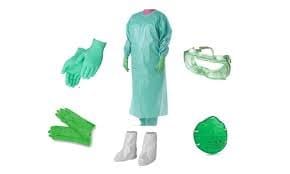Scientists at the University of Pittsburgh Swanson School of Engineering have formulated a textile coating that repels liquids like blood and saliva, and prevents viruses from adhering to surfaces. The coating withstands ultrasonic washing, scrubbing and scraping and is likely to be used in in hospital gowns and waiting room chairs to prevent infection.
The coating may have broad applications in healthcare: everything from hospital gowns to waiting room chairs could benefit from the ability to repel viruses, particularly ones as easily spread as adenoviruses.
What makes the coating unique is its ability to withstand ultrasonic washing, scrubbing and scraping. With other similar coatings currently in use, washing or rubbing the surface of the textile will reduce or eliminate its repellent abilities.
Galante put the new coating to the test, running it through tens of ultrasonic washes, applying thousands of rotations with a scrubbing pad (not unlike what might be used to scour pots and pans), and even scraping it with a sharp razor blade. After each test, the coating remained just as effective.
At the moment, the coating is applied using drop casting, a method that saturates the material with a solution from a syringe and applies a heat treatment to increase stability. But the researchers believe the process can use a spraying or dipping method to accommodate larger pieces of material, like gowns, and can eventually be scaled up for production.

